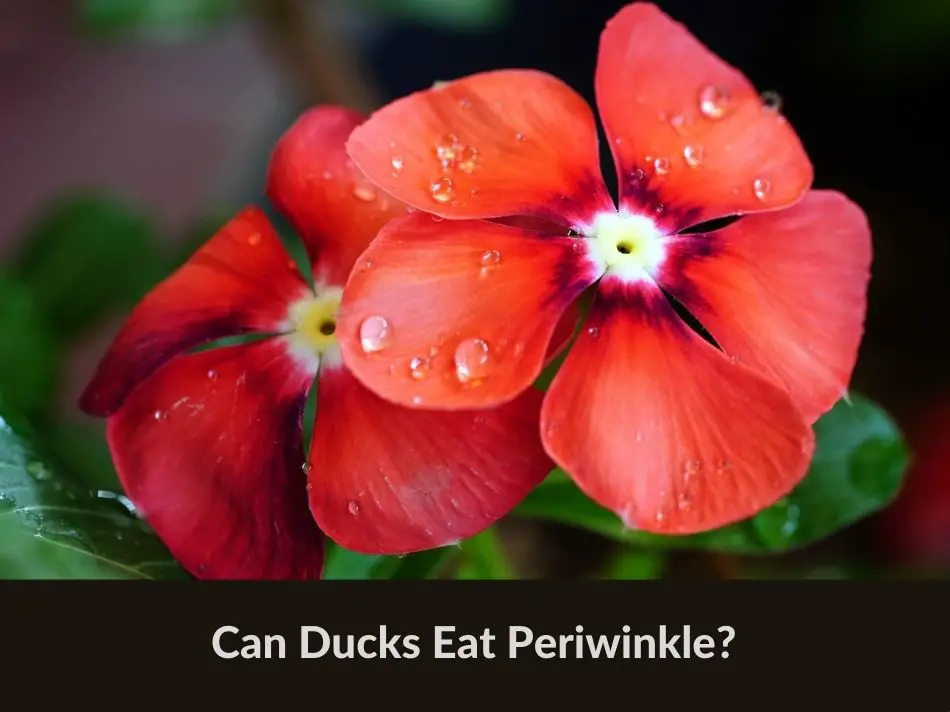Ducks are omnivorous birds, which means they have a varied diet including plants, insects, small fish, and algae. In their natural habitat, they might consume aquatic plants, small crustaceans, snails, and even tiny amphibians. But, can ducks eat periwinkle?
No, ducks should not eat periwinkle. Periwinkle contains alkaloids, which is toxic to ducks. Ingesting substantial amounts of alkaloids can potentially be harmful and cause symptoms such as digestive upset, lethargy or more severe health complications.
This article will address the question of whether ducks can eat periwinkle. We will explore the general diet of ducks, the potential benefits or risks of feeding periwinkle to ducks, and guidelines for feeding.
What Is Periwinkle?
Before delving deeper into the implications of ducks consuming the periwinkle flower, it’s essential to understand the plant itself.
Periwinkle, scientifically classified as part of the Vinca genus, consists of several species, with Vinca minor and Vinca major being the most common. The plant is native to Europe but has found its way to various parts of the world due to its ornamental appeal.
The periwinkle plant is a perennial herb, characterized by its trailing stems, shiny evergreen leaves, and star-shaped flowers that come in shades of blue, purple, and white. Its ground-covering nature makes it a popular choice for gardens, especially in areas where one desires a low-maintenance plant that suppresses weed growth.
Beyond its aesthetic value, periwinkle has historical significance in traditional medicine. For centuries, various cultures have used parts of the periwinkle plant to treat ailments like diabetes, coughs, and fluid retention. Yet, its modern medicinal reputation is primarily associated with the alkaloids it contains, which have applications in modern pharmacology, particularly in improving cerebral blood flow and cancer treatments.
Understanding the nature and characteristics of the periwinkle flower sets the foundation for recognizing why its consumption might be of concern for certain animals, such as ducks.
Alkaloids in Periwinkle
Alkaloids are a group of naturally occurring chemical compounds predominantly found in plants. They contain mostly basic nitrogen atoms and can have a variety of effects on humans and animals. The presence of alkaloids in a plant usually serves as a natural defense against herbivores, insects, and microorganisms.
The periwinkle plant is no exception, as it contains several alkaloids, some of which have known pharmacological effects.
The most notable alkaloids found in periwinkle are vincamine, vinpocetine, and vincristine. These compounds have shown potential in medicinal applications for humans, especially in the areas of increasing blood flow to the brain and treating specific types of cancers.
Yet, their benefits to human health do not automatically translate to safety for ducks or other animals.
Risks to Ducks
For many animals, the consumption of alkaloids can lead to toxic reactions. Ducks, with their unique digestive and metabolic systems, can be especially susceptible.
- Toxicity: The primary concern is the potential toxicity of these alkaloids. Ingesting significant quantities of periwinkle might lead to various symptoms in ducks, ranging from digestive distress and lethargy to more severe neurologic symptoms.
- Digestive Irritation: Even if the consumed amount isn’t lethal or highly toxic, alkaloids can irritate the duck’s digestive system, causing discomfort, diarrhea, or reduced appetite.
- Bioaccumulation: Another risk is bioaccumulation. While a single consumption of periwinkle might not cause immediate harm, frequent ingestion could lead to the accumulation of alkaloids in the duck’s system. This buildup can pose long-term health risks, including liver or kidney damage.
Behavioral Observations
In nature, many animals instinctively avoid plants that might be harmful to them. Ducks, with their varied diet consisting of aquatic plants, small fish, insects, and grains, tend to be selective.
They have evolved behaviors to identify and avoid certain noxious plants and substances. Some anecdotal observations suggest that ducks might not be particularly drawn to periwinkle and often avoid it in favor of other, more palatable food sources.
Recommendations
Given the presence of potentially harmful alkaloids in the periwinkle plant and the risks associated with their consumption, it’s advisable for duck owners and those maintaining duck habitats to be cautious.
- Monitoring: If ducks have access to areas with periwinkle, monitor their behavior. If they show signs of distress or illness after possibly consuming the plant, consult a veterinarian immediately.
- Habitat Design: Consider designing the habitat in such a way that ducks don’t have direct access to large patches of periwinkle. While it might not be their first choice for food, the possibility of ingestion exists, especially if other food sources are scarce.
Other Flowers Ducks Can Eat
Beyond the debated periwinkle, ducks have a penchant for a variety of flowers that not only satisfy their taste buds but also provide essential nutrients. From fragrant lilacs to vibrant petunias, ducks can safely indulge in several floral treats.
These flowers can be an exciting addition to their diet, offering a mix of flavors and textures. Before introducing any flower to a duck’s diet, it’s always essential to make sure that the flower is safe and non-toxic.
Below are some more flowers ducks can eat:
Make sure to see our thorough list of plants and flowers ducks can enjoy.
Conclusion
In conclusion, while the periwinkle flower is undeniably beautiful and a favored choice among gardeners, caution is advised when it comes to ducks. The alkaloids present in the plant can pose significant health risks to these birds.
Disclaimer: The information in this article is for informational purposes only. I'm not an expert or a veterinarian.


